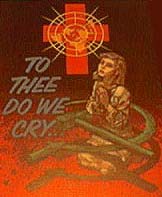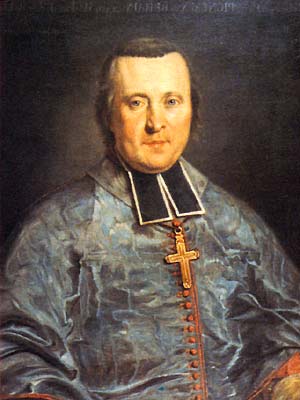 |
| St. Joseph, Patron Saint of Anti-Communists |
| The Role of Christianity and the Nguyen Imperial Monarchy of Vietnam |
 |
| Christianity and Vietnam have a long history together, sometimes happy and sometimes troubled. Catholic missionaries were the first westerners to live among the Vietnamese People during the era of the late Le Dynasty. However, Christianity and the Nguyen Dynasty were brought together through the persecutions both endured at the hands of the Tay Son regime. The Tay Son had launched a war of total genocide against the Nguyen House of South Vietnam. Every member of the family was massacred except for the Prince Nguyen Phuc Anh who managed to evade the Tay Son forces. |
 |
| In 1777 Prince Nguyen Anh found refuge on Phu Quoc Island at the hands of Monsignor Pierre Pigneau de Behaine, Bishop of Adran. Long after Nguyen Anh united the country and became Emperor Gia Long of Viet Nam, he would always remember the Christians who gave him shelter and saved his life. He promised that under his reign the Christians would have full freedom to worship as they wished and to spread Christianity among any who wished to accept it. These actions however, brought down the wrath of the Tay Son ruler Canh Thinh. He ordered many restrictions against Christianity and finally, on August 17, 1798, issued an |
| HIM Emperor Gia Long |
| Bishop Pigneau de Behaine of Adran |
| edict to destroy all Catholic churches, sanctuaries and seminaries and there ensued a horrific persecution of Vietnamese Christians at the hands of the Tay Son regime. |
| However, the efforts to wipe out Christianity failed completely and only increased the popular support for Emperor Gia Long and the Nguyen Imperial Dynasty. It was during this period that the Blessed Virgin Mary, Our Lady of La'Vang, Vietnam, appeared in 1798 with a message of hope and comfort to the oppressed people. When the Nguyen Dynasty reunited the country and Emperor Gia Long was enthroned in Hue, it was a time of great celebration for the Christian community in Vietnam, who had fought for the Nguyen Dynasty and had finally achieved the defeat of the usurpers, the end of the persecutions and the reunification of Vietnam with full freedom of religion for their Church. In fact, the oldest son of Emperor Gia Long, Crown Prince Nguyen Phuc Canh, became the first Vietnamese royal to convert to Christianity and the first member of the Nguyen Dynasty to join the Catholic Church. At last, Christians could enjoy equal status with the established faiths of Buddha and Confucius in Vietnam. |
 |
| HIH Crown Prince Nguyen Phuc Canh |
 |
| Our Lady of Lavang |
| However, ambitious French politicians soon took advantage of the missionaries to benefit their own plans to conquer Vietnam, drawing the clergy away from spiritual matters and into temporal affairs of the Vietnamese government. In particular, after inciting hatred against the Dynasty, French propaganda writers attacked the three successors of Emperor Gia Long: Minh Mang, Thieu Tri and Tu Duc. The French government, which had also been extremely cruel to the Christians in France during the revolutionary period, was opposed to the Nguyen Emperors for their nationalistic devotion to Vietnamese independence and attacked all three of these monarchs as being brutal despots who persecuted Christians. However, honest witnesses, even foreigners, and the facts of history disprove all of these accusations. Despite what was said by the propaganda experts Emperors Minh Mang, Thieu Tri and Tu Duc were known to be gentle, scholarly and compassionate rulers. |
| These men only took action when the national integrity of Vietnam was threatened and never punished people simply for their religion. In fact, Emperor Thieu Tri, for example, showed more mercy and compassion that most leaders of the time, even in Christian nations, did not have. He dismissed many death sentances against foreign or foreign-influenced subversives so as to keep |
| Vietnam and all the People in peace with each other and the other world powers. In 1886, during the reign of Emperor Dong Khanh, Christianity and the Nguyen Dynasty restored the old bonds of friendship and existed from that time onward in a peaceful partnership with each other and the other religions of Vietnam. In the years that followed Christianity flourished as more churches were established and more |
| Vietnamese priests rose to prominent positions within the Church. When Emperor Bao Dai succeeded his father as the traditional leader of Vietnam, Christianity's role in the country had come full circle. Many of the reforms instituted by Emperor Bao Dai were happily welcomed by the Catholic community in particular. One of his earliest acts was to abolish the ancient |
| HIM Empress Nam Phuong |
| custom that Emperors could take more than one wife. The Christian community was also greatly pleased when Emperor Bao Dai married the Catholic lady Nguyen Huu Hao, who he elevated higher than any other woman in Vietnamese history as Empress Nam Phuong. It was the first time in Vietnamese history that the Emperor had married a common citizen, and also the first time a Vietnamese Emperor had ever married a Christian. Later, when the Communists began trying to take control of Vietnam some of the first groups to join in support of Emperor Bao Dai and a free nationalist Vietnam were the Christian leaders such as Tran Van Ly of the Catholic bloc. It was a natural choice that virtually all religious groups in Vietnam supported their Emperor against Ho Chi Minh. Whereas the Communists condemned all religion and all things sacred, Emperor Bao Dai represented religious freedom and tolerance. Buddhist, Catholic, Hoa Hao and Cao Dai all united with the Emperor's new government. After the war Emperor Bao Dai himself converted to Christianity and was baptized "Jean-Robert" in France. |
| Continue to read about Christian support for the Monarchy |
 |